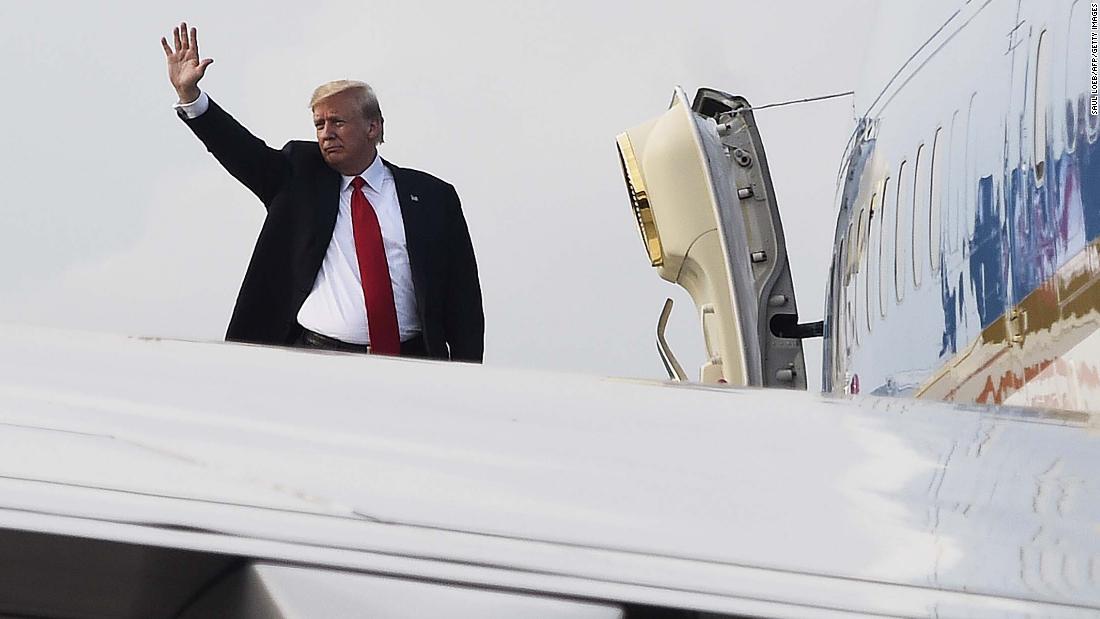[ad_1]
But he also made less celebratory calls — to his lawyers — to discuss what he faces next: a potential showdown with Robert Mueller over his willingness to answer the special counsel’s questions about the Russia investigation.
The President’s legal team is already assembled in Washington, eager to sit down with their client to game out the next major move in anticipation of a meeting with the special counsel either later this week or next week.
They are involved in a high-stakes confrontation with Mueller — one that could eventually result in a subpoena of the President. Their legal jockeying comes as Trump is increasingly lashing out against the special counsel, and midterm elections that could upend the balance of power in Washington draw nearer.
“We want to close this deal as much as we can, and we want to see what he thinks is important because we really haven’t had a chance to have a relaxed conversation with him in a few weeks,” Trump lawyer Rudy Giuliani told CNN in a phone interview.
“The most important thing we need right now is his input,” Giuliani said, adding that the legal team hopes this will happen by Thursday.
While the President still entertains the possibility of sitting down with Mueller, most of his legal team remains skeptical, according to multiple sources with knowledge.
“I think he would like to testify in a situation in which we tell him it’s fair and he’s going to be received objectively,” Giuliani said. “I think he still wants to carve out a way in which he can testify, and I think it is our job to figure out a way we can do that.”
If the President refuses an interview with Mueller’s office, prosecutors could then use a grand jury to subpoena him to testify under oath.
Some of his attorneys are betting that Mueller, who may not want to prolong the investigation, will not want to issue a subpoena to compel the President’s testimony, especially while talks are ongoing.
As one source with knowledge put it, “They may not want to subpoena him, and Trump’s lawyers don’t want the President to sit for an interview, so they’re in a bit of a limbo.”
Trump’s lawyers, according to multiple sources, don’t want to put him in a situation where he could — even unwittingly — perjure himself.
Giuliani has even publicly said that the President shouldn’t testify because “our recollections keep changing.”
Trump could also sit for an interview and decline to answer questions — but that would present political challenges.
His legal team understands that it would be politically unpalatable for a president to plead his fifth amendment right not to incriminate himself, especially since the President himself said in 2016, “The mob takes the fifth. If you’re innocent, why are you taking the fifth amendment?”
The risk of a subpoena
At this point, Trump’s attorneys are only guessing about Mueller’s intent regarding any subpoena for the President.
“It really depends on how he does the subpoena. The narrower the subpoena, the better chance it’s successful,” Giuliani said. “The broader the subpoena, the less it will be. We’d rather negotiate something with him (Mueller) then we’re all in control of it, rather than a court, but I don’t know if we can do that. We’re going to see, we’re going to try.”
If negotiations do break down, “this issue is where the rubber meets the road,” said a source with knowledge. “If Trump says no to a subpoena, this drags on nine to 15 months.”
That’s clearly not what the President wants, and Trump’s attorneys are banking on the fact that, as one source said, “Mueller is a practical guy.”
The relationship between the two sides suffered a real setback after Mueller sent the case to Manhattan federal prosecutors, who carried out the raid on the office and home of Michael Cohen, Trump’s personal attorney, in April. One source called it a “game changer,” not only for the Trump lawyers, but also for the President himself, who was angered by the treatment of his attorney and publicly called it a “disgrace.” Mueller’s team, for their part, have opted not to respond directly to Trump’s continued public attacks.
Team Trump is continuing to hone its legal arguments against compelled testimony, first asserting in a January memo to the special counsel that the President can’t obstruct justice or be subpoenaed because the Constitution entitles him to end the investigation if he were so inclined.
In addition, Giuliani has previously said that Mueller told Trump’s lawyers he believes he cannot indict a sitting president. As a result, Trump’s lawyers don’t see a need for his testimony.
His attorneys argue they have provided all the contemporaneous documents and testimony Mueller could possibly need from people involved, except for Trump. They point to their cooperation in providing tens of thousands of pages of documents and testimony by other witnesses and to their waiver of executive privilege as they allowed current and former advisers to speak with the special counsel.
Trump does not keep his own notes and does not email, according to multiple sources. Trump’s attorneys argue that because he is the President, he can only be called upon to testify in extreme circumstances.
For his part, Mueller has told the President’s attorneys that he needs to interview Trump to determine his intent during his interactions with his associates regarding the investigation.
[ad_2]
Source link




